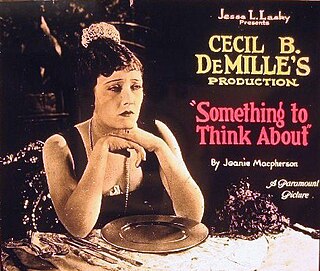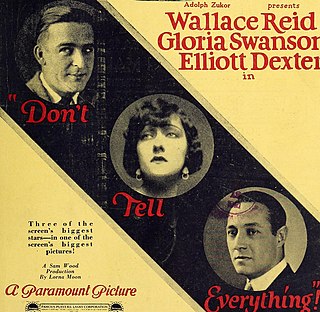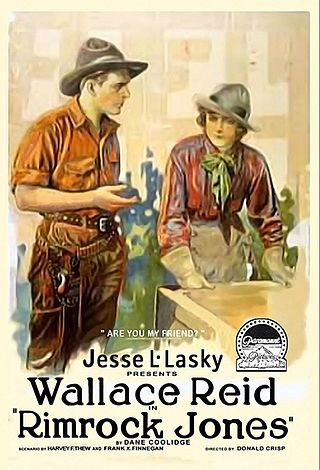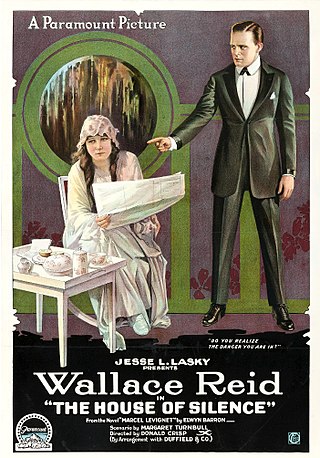
The Trail of the Lonesome Pine is a 1923 American silent Western film directed by Charles Maigne and starring Mary Miles Minter. It was adapted by Will M. Ritchey from the play and novel of the same name by John Fox Jr. This was the second time that Maigne had directed Minter in an adaptation of a Fox novel, the first being 1920's A Cumberland Romance. This was Minter's final film; her contract with Paramount Pictures was not renewed, and she stated that she was "through" with films. As with many of Minter's features, The Trail of the Lonesome Pine is thought to be a lost film.

Joan the Woman is a 1916 American epic silent drama film directed by Cecil B. DeMille and starring Geraldine Farrar as Joan of Arc. The film premiered on Christmas Day in 1916. This was DeMille's first historical drama. The screenplay is based on Friedrich Schiller's 1801 play Die Jungfrau von Orleans. This film was considered to be the "first cinematic spectacle about Joan of Arc."

The Little American is a 1917 American silent romantic war drama film directed by Cecil B. DeMille. The film stars Mary Pickford as an American woman who is in love with both a German soldier and a French soldier during World War I. Art direction for the film was done by Wilfred Buckland. John Hay Beith was technical advisor on the film, credited under his pen name, Ian Hay.

The Woman God Forgot is a 1917 American silent romance film directed by Cecil B. DeMille and starring Geraldine Farrar. Art direction for the film was done by Wilfred Buckland.

The Devil-Stone is a 1917 American silent romance film directed by Cecil B. DeMille, co-written by his mother Beatrice deMille and Jeanie MacPherson, and starring Geraldine Farrar.

The Whispering Chorus is a 1918 American silent psychological drama film directed by Cecil B. DeMille. It is the first and earliest film considered a psychological drama.

Old Wives for New is a 1918 American silent drama film directed by Cecil B. DeMille. It is based on the 1908 novel of the same title by David Graham Phillips.

We Can't Have Everything was a 1918 American silent drama film produced and directed by Cecil B. DeMille and adapted for the screen by his brother, William C. De Mille. The film was based upon a 1917 novel of the same name by Rupert Hughes. Art direction for the film was done by Wilfred Buckland.

The Squaw Man is a 1918 American silent Western film directed by Cecil B. DeMille. It is a remake of DeMille's 1914 film of the same name, which is based upon a 1905 play by Edwin Milton Royle. The film was reportedly made as an experiment to prove DeMille's theory that a good film is based on a good story. It cost $40,000 to make and grossed $350,000. It would be remade again by DeMille in 1931.

Something to Think About is a 1920 American silent drama film directed by Cecil B. DeMille. The film stars Elliott Dexter and Gloria Swanson.

Don't Tell Everything is a 1921 American silent drama film directed by Sam Wood and starring Gloria Swanson and Wallace Reid. Wood apparently created this film in part from outtakes left over from Cecil DeMille's The Affairs of Anatol (1921). It is not known whether the film currently survives.
Hawthorne of the U.S.A. is a 1919 American silent comedy adventure film directed by James Cruze and starring Wallace Reid and Lila Lee. The film is based on the play of the same name by James B. Fagan. It had run on Broadway in 1912 with Douglas Fairbanks in the title role. The scenario for the film was written by Walter Woods. The film was produced by Famous Players–Lasky, and distributed by Famous Players under the Paramount-Artcraft Picture banner.

Excuse My Dust! is a surviving 1920 American silent comedy-drama film produced by Famous Players–Lasky and distributed by Paramount Pictures. It is based upon a Saturday Evening Post short story "The Bear Trap" by Byron Morgan. Sam Wood directed Wallace Reid. Reid's young son, Wallace Jr., makes his first screen appearance here. This film is preserved in the Library of Congress.

Big Timber is a 1917 American silent film Northwoods/drama produced by the Oliver Morosco Company and distributed by Paramount Pictures. It was directed by William Desmond Taylor and starred Kathlyn Williams and Wallace Reid. It is not known whether the film currently survives, and it may be a lost film.

Barbary Sheep is a 1917 American silent drama film produced by Famous Players–Lasky and distributed through Artcraft Pictures, an affiliate of Paramount Pictures. The film was directed by Maurice Tourneur and stars Elsie Ferguson in her motion picture debut. This picture is said to have George M. Cohan in his film debut as well. It is an adaptation of the 1907 novel Barbary Sheep by British writer Robert Hichens. It was thought to be a lost film until an 8-minute clip or fragment was found in the Gosfilmfond archive.

Sporting Life is a lost 1918 American silent drama film directed by Maurice Tourneur. It is the first film for sisters Faire Binney and Constance Binney, from the Broadway stage. Tourneur would re-film this story again in 1925.

The Whip is a 1917 American silent drama film directed by Maurice Tourneur that is based on the play of the same name by Henry Hamilton and Cecil Raleigh. The film stars Alma Hanlon, June Elvidge, and Irving Cummings. It also features Bobby Vernon, Wallace Beery, as well as Gloria Swanson in one of her early film roles. The film survives and has been released on DVD.

Rimrock Jones is a lost 1918 American silent Western film directed by Donald Crisp and starring Wallace Reid.

The House of Silence is a lost 1918 American silent drama film directed by Donald Crisp and written by Elwyn Alfred Barron and Margaret Turnbull. The film stars Wallace Reid, Ann Little, Adele Farrington, Winter Hall, Ernest Joy, and Henry A. Barrows. The film was released on April 8, 1918, by Paramount Pictures.

Green Eyes is a 1918 American silent drama film directed by Roy William Neill and written by Ella Stuart Carson, John Lynch, and R. Cecil Smith. The film stars Dorothy Dalton, Jack Holt, Emory Johnson, Doris May, Robert McKim, and Clyde Benson. The film was released on August 11, 1918, by Paramount Pictures. It is not known whether the film currently survives.



















